Papitas Taypuycha -Earthing Potatoes
A collaboration between visual artists Daniela Edith Zambrano Almidón and Åsa Sonjasdotter.
Root fruits are elements of maternal shelter, vessels of migratory stories and global movement. The action of Papitas Tarpuycha – Earthing Potatoes starts with the re-learning and recognition of practices based by the place of origin, the mother Earth. The action brings voices together for the generation of new forms of connection and transformation.

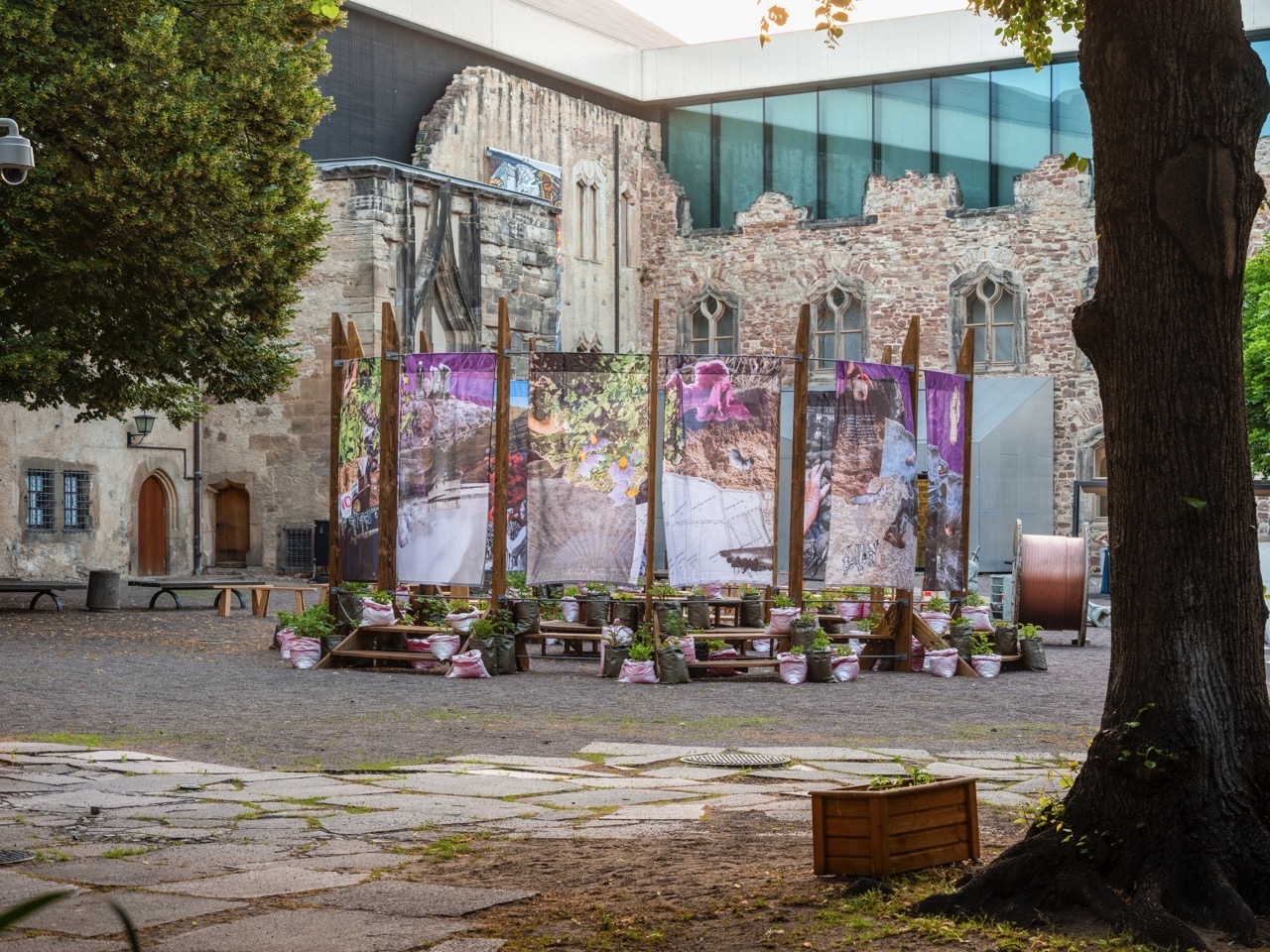
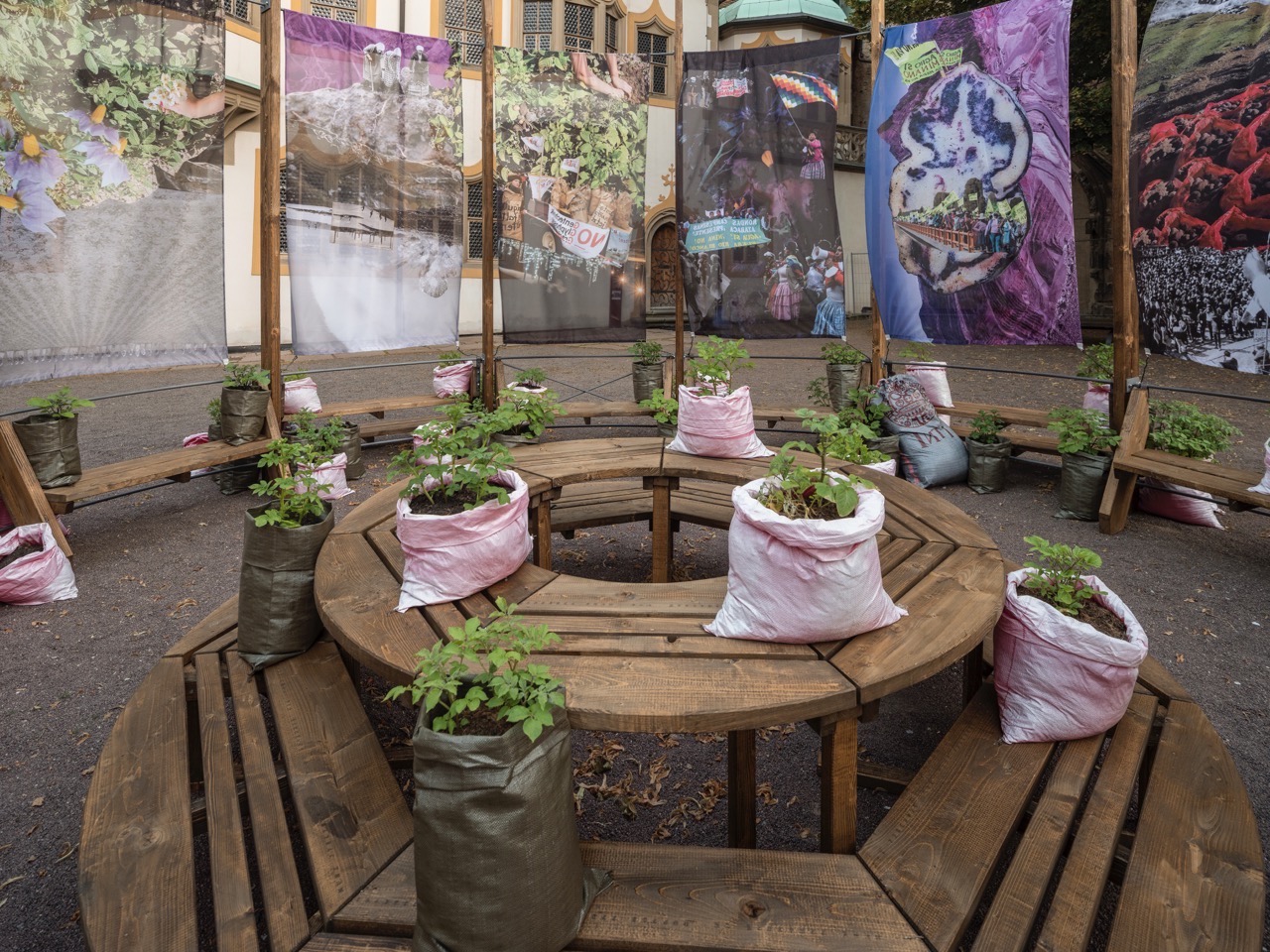


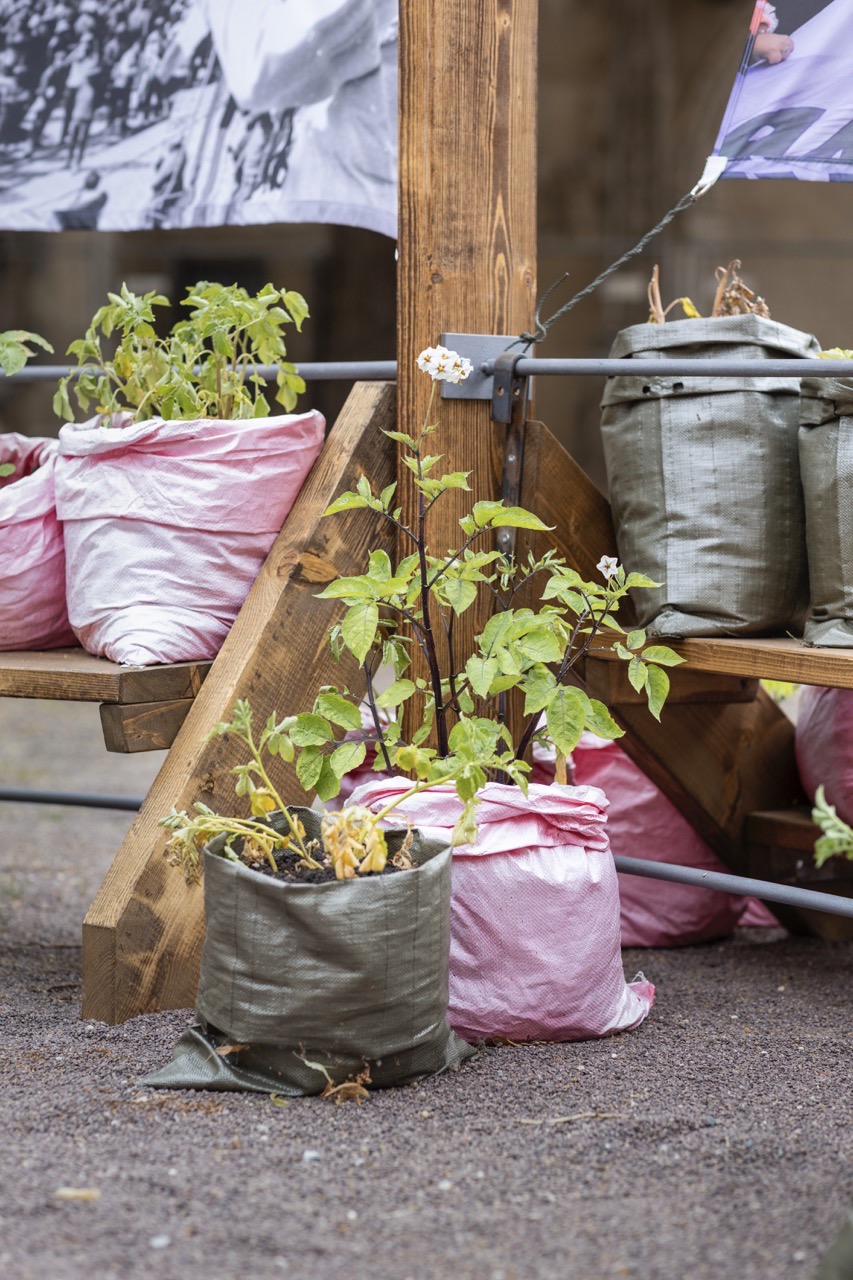
PLANETARY PEASANTS
Kunstmuseum Moritzburg, Halle May 23–September 14, 2025.
For the 500 year commemoration of the German Peasant War, Zambrano Almidón and Sonjasdotter has produced the piece Los testimonios de papa sobre la defensa de la tierra / The potatoes’ Testimonies on the Defense of the Earth / Kartoffeln Zeugnis über die Verteidigung der Erde that activates stories of ongoing solidarity, struggle, and resistance among peasants in the Central Andean region of Huanuco, in Central Germany, and beyond, connecting them by cultivating plants and stories of papas / potatoes/ Kartoffeln. Heirloom varieties grow at each base of the circular installation, which were cultivated in Europe since the times of the colonisation of Abya Yala. As if they were heraldic emblems themselves, the potatoes bear the rainbow colours of both the German peasants’ flag of freedom and the Indigenous Wiphala flag, signifying 500 years of struggle for the right to farm freely and fairly, without oppression.

MUNICIPAL KITCHENS, nGbK, 26 June - 18 August 2024.
In this exhibition and series of workshops, Zambrano Almidón and Sonjasdotter, in collaboration with curator Gatari Surya Kusuma, brings to debate and reflection the topic of migration and food production through the root crops of potatoes and cassava. Potato and cassava are growing in several countries. The plants have migrated through various means, and each variety has their own specificity. Through the migratory movements of potato and cassava, this exhibition and series of workshop invites the audience and the participants to experience making food together and reflect on how our embodied knowledge can reflect different relations to food and cooking as ways of socialising and sharing knowledge.
Papitas Tarpuy-Cha connects with the Flamingo collective who support refugee women* and children, growing healing herbs in their garden in memory of Hevrîn Xelef in Neukölln, as well as with the initiative Women in Exile founded in Brandenburg by refugee women fighting for their rights. This series of workshops bring voices together against abuse of, with, and by Mother Earth, to generate healing relations and transformations.

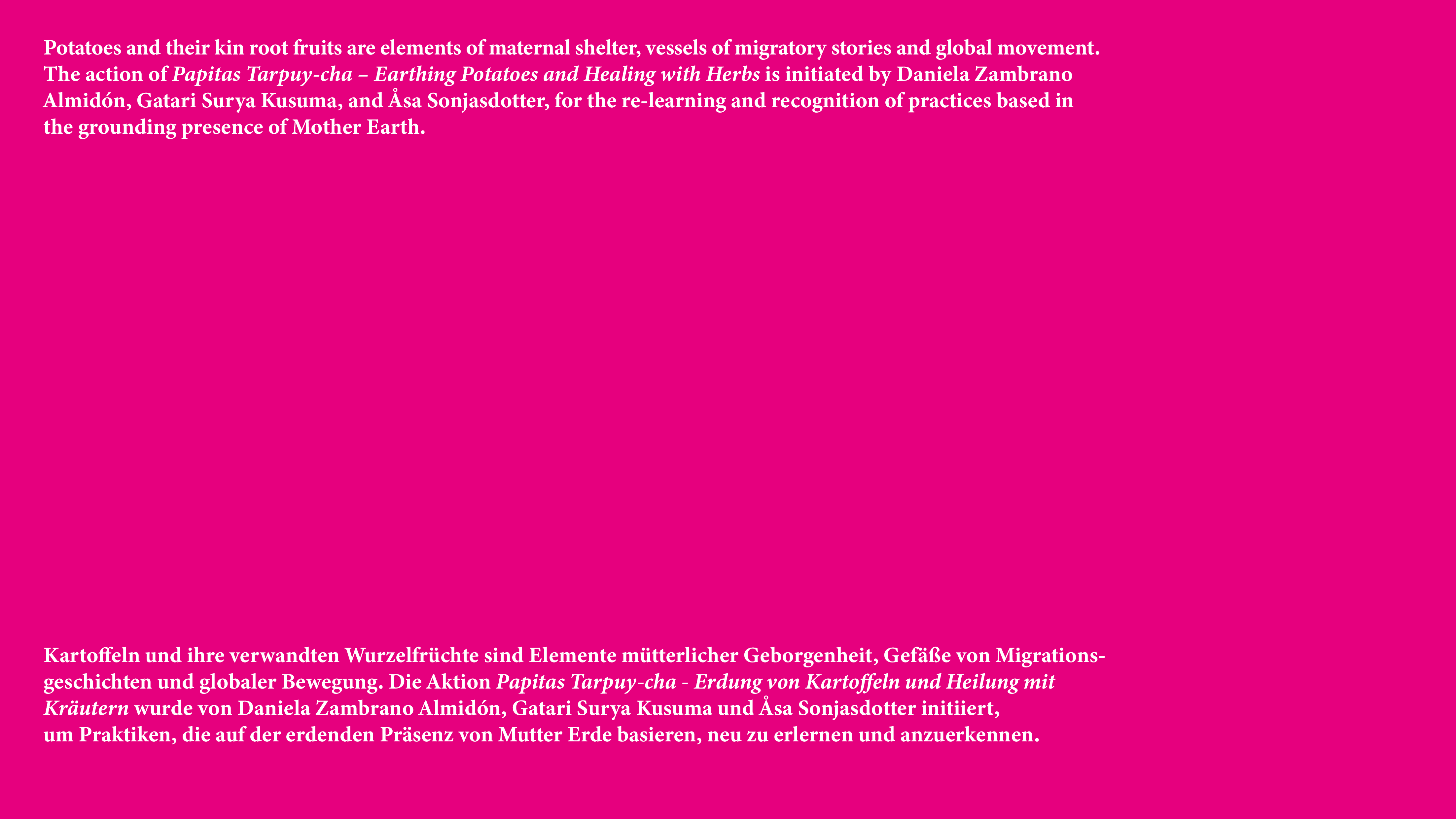







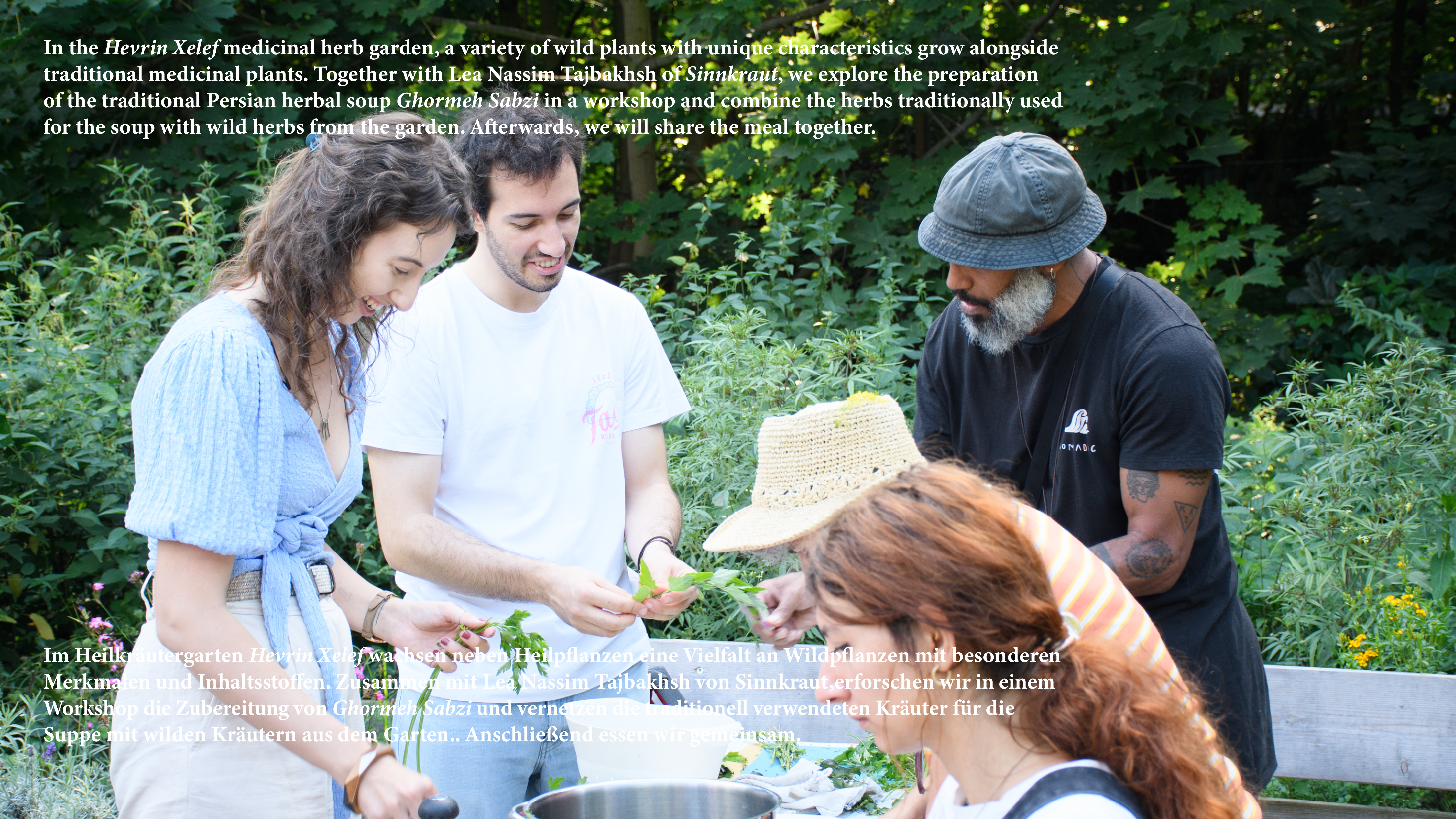










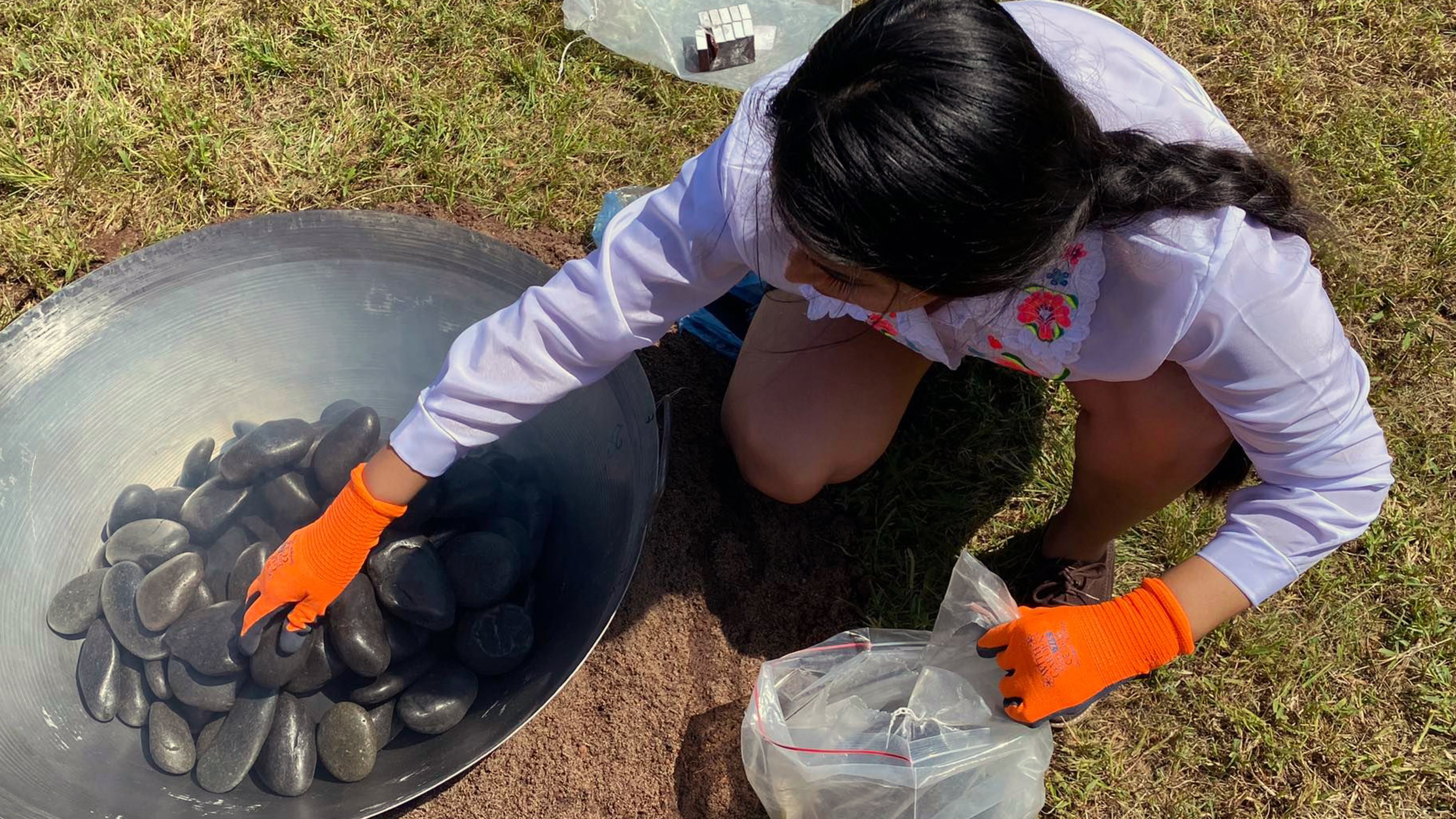


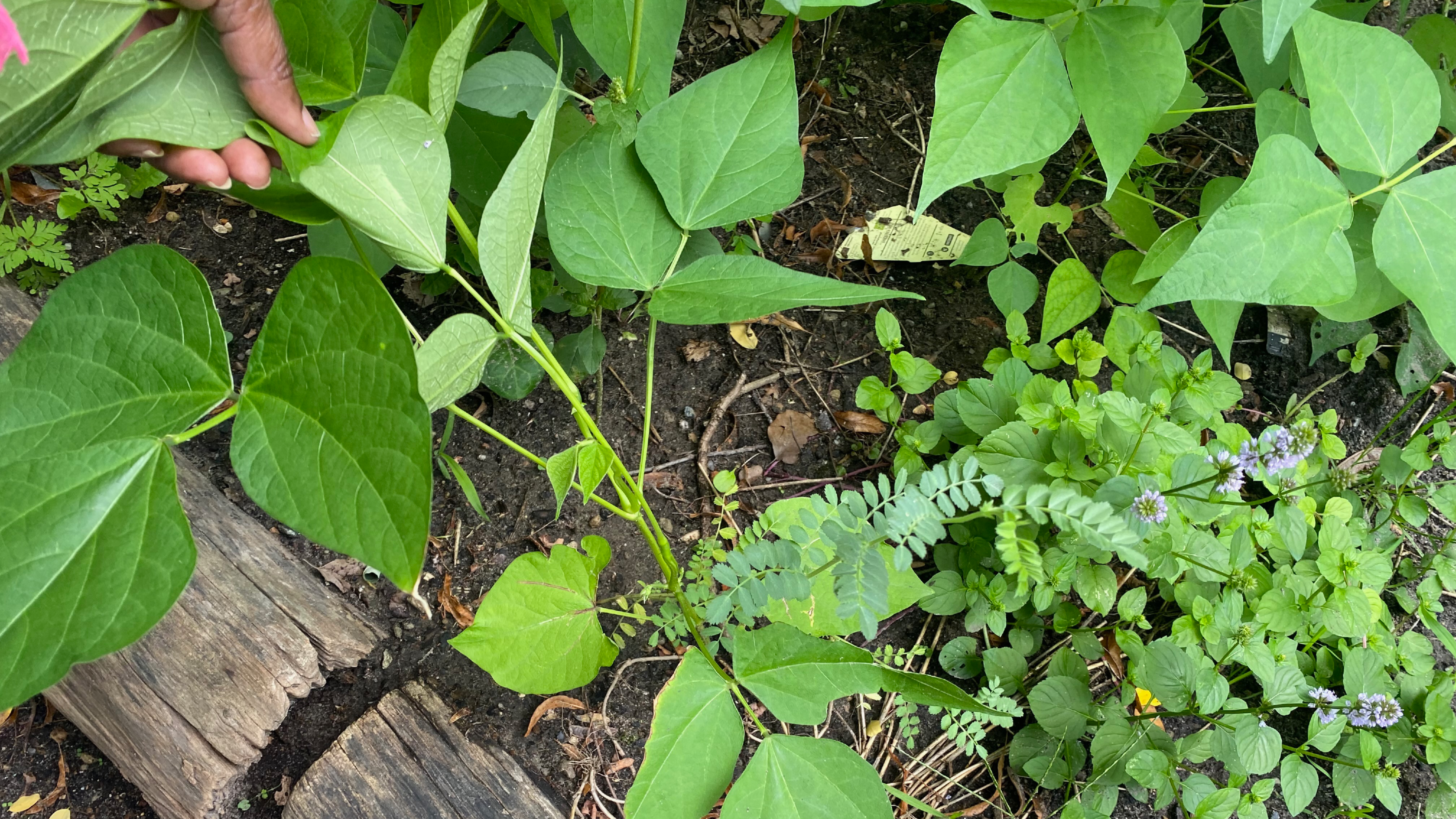


Workshop 1. Joint preparation of the traditional Persian herbal soup Ghormez Sabzi in the Hevrin Xelef Garden with Flamingo e.V. – Network for Refugee Women* and children
We begin our visit to Flamingo e.V. – Network for Refugee Women* and children with a Hekayat tour – a story Circle, of the transcultural Hevrin Xelef garden, led by Anuscheh Amir-Khalili. Anuscheh will discuss the history of the garden, its role in feminist resistance, and its connection to medicinal plants, the earth, and her sister project, the women’s village Jinwar in Rojava.
In the Hevrin Xelef medicinal herb garden, a variety of wild plants with unique characteristics grow alongside traditional medicinal plants. Together with Lea Nassim Tajbakhsh, we explore the preparation of the traditional Persian herbal soup Ghormeh Sabzi in a workshop and combine the herbs traditionally used for the soup with wild herbs from the garden. Afterwards, we will share the meal together.
Ghormeh Sabzi exemplifies the deep connection between food, culture, and community. This herb stew, a centuries-old Persian dish, is believed to have been developed over 2,000 years ago. Using wild herbs not only honors and celebrates this tradition but also adds a sustainable and accessible component. Wild plants, often rich in nutrients, can be gathered in nature, making this nutrient-rich and aromatic dish, which invigorates the senses, accessible to all.
FLAMINGO e.V. is a network for refugee women* and children from Berlin-Neukölln and deals with the topics of medicinal herbs, flight, migration and feminist communities within the transcultural medicinal herb garden Hevrin Xelef, which has been established since 2019. The garden is a sister project with the women’s village of Jinwar in north-east Syria. Here, seeds and knowledge about healing, trauma and grief are exchanged in communities.
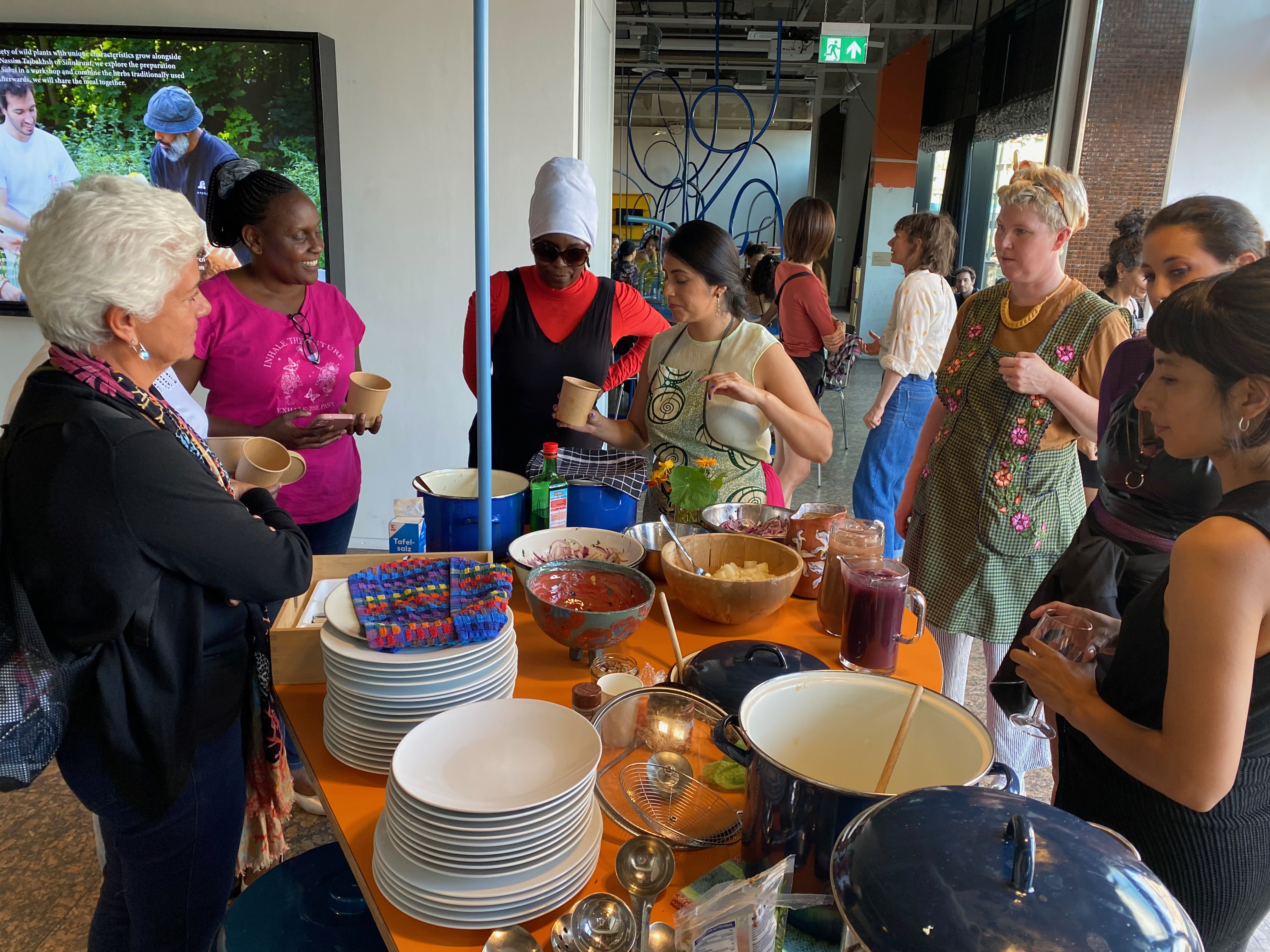
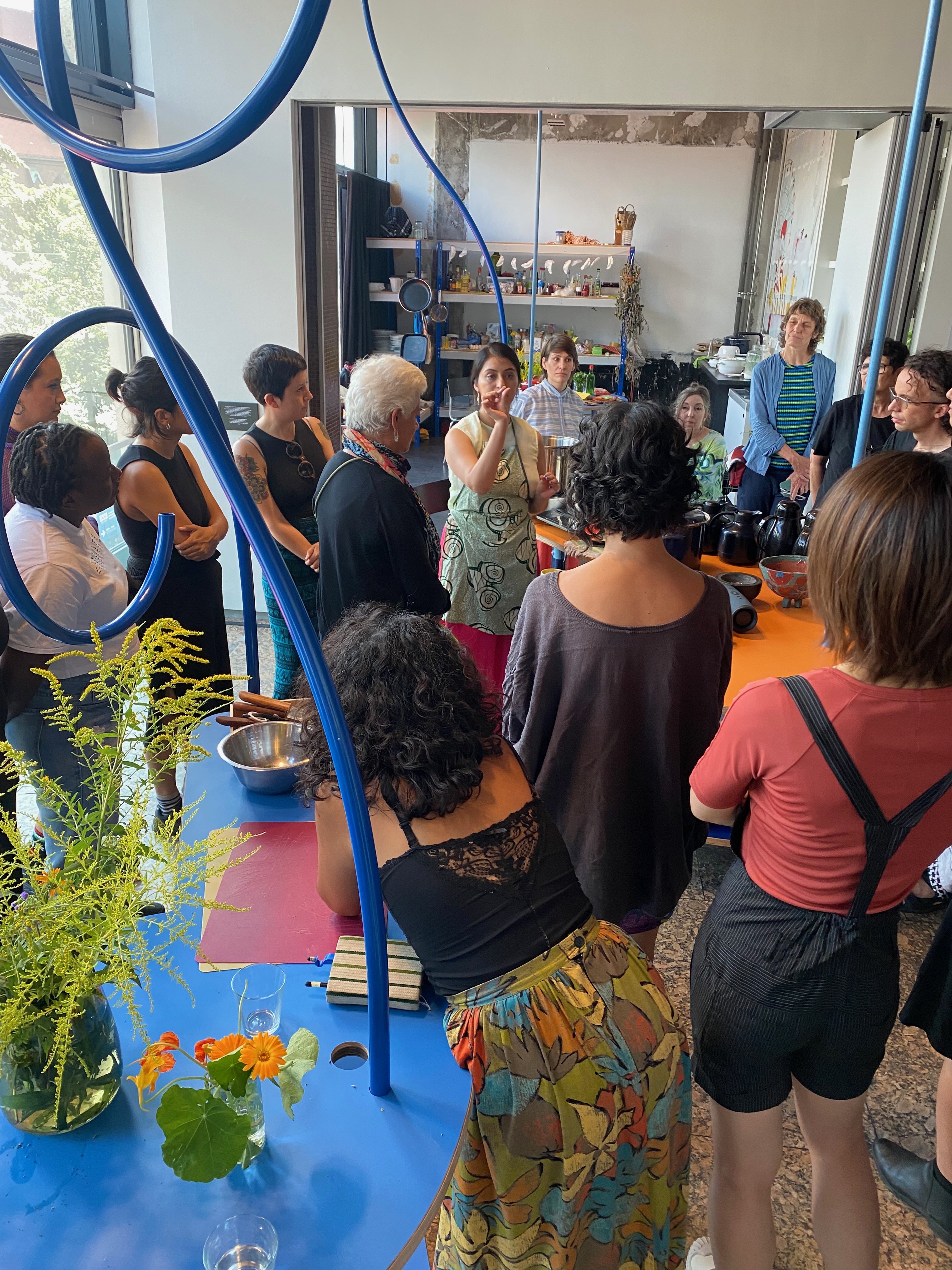
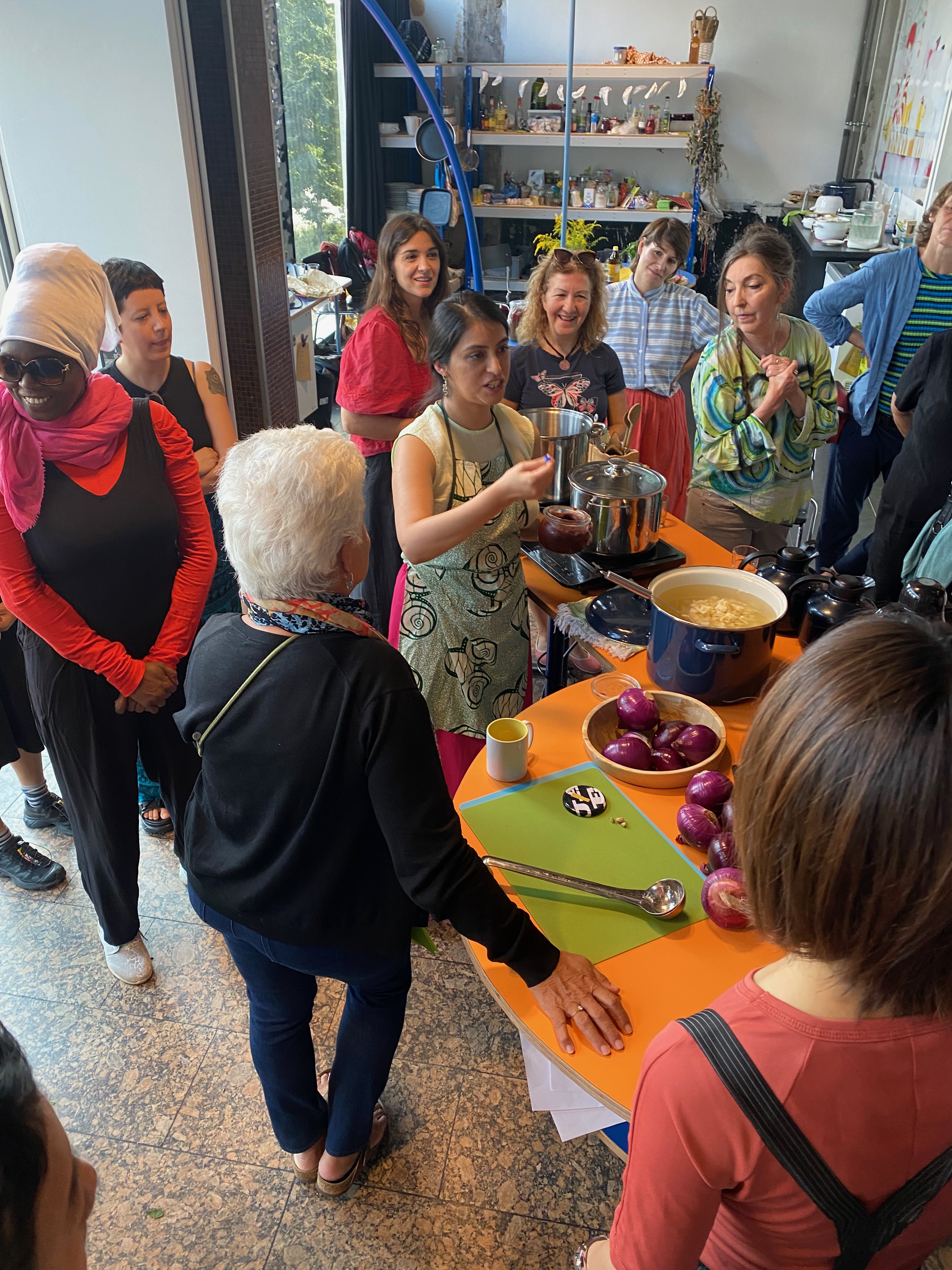
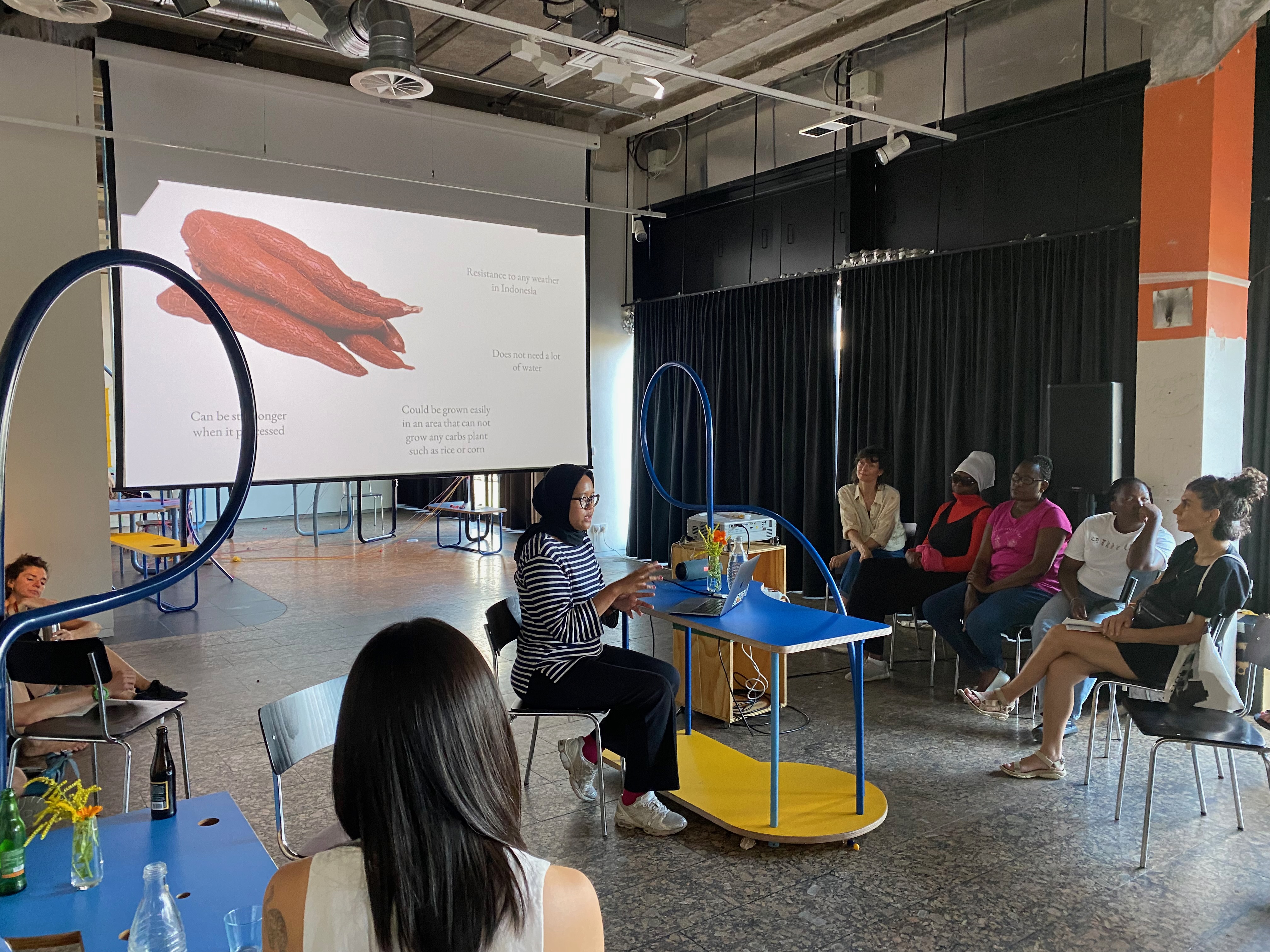

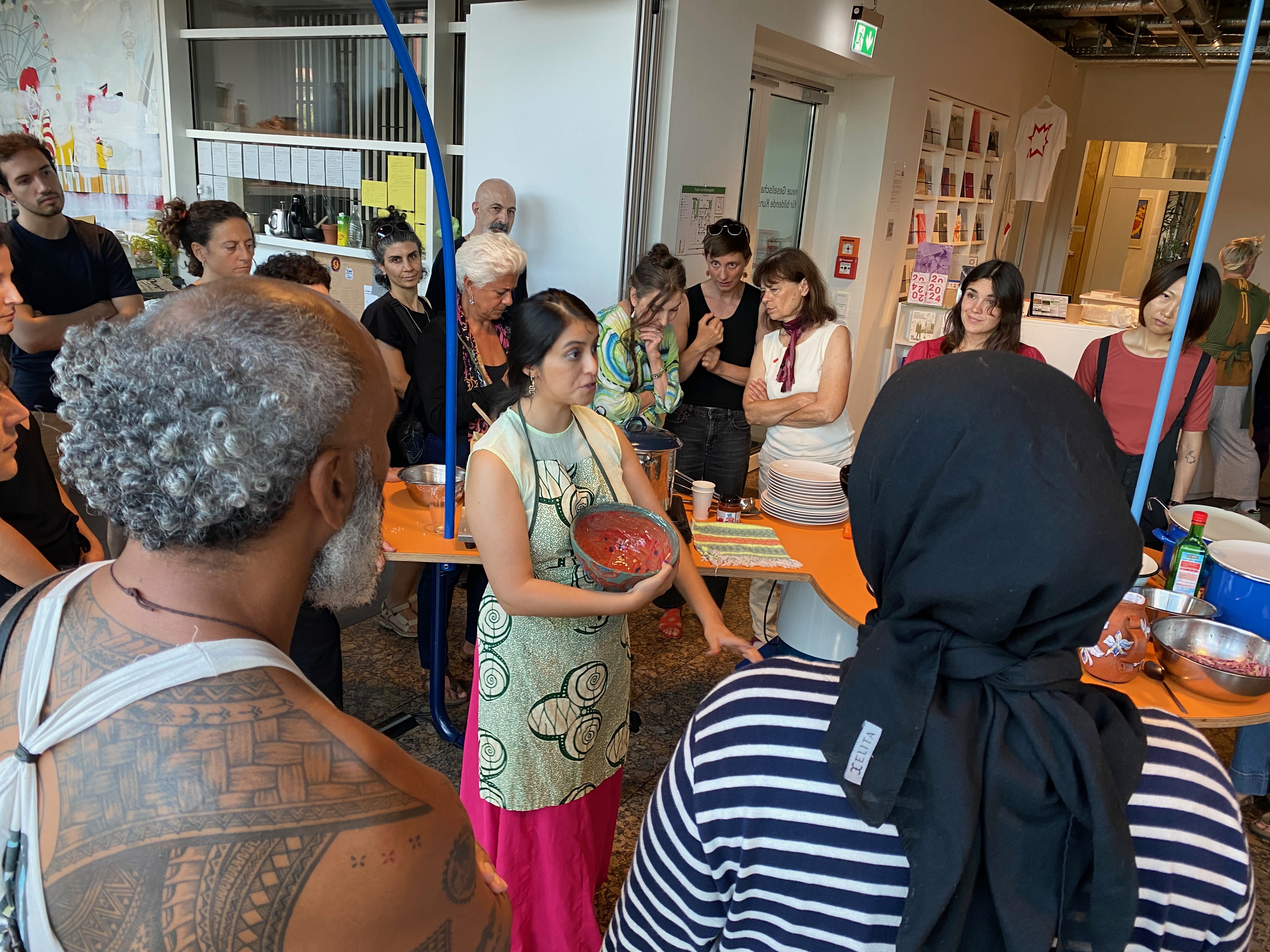
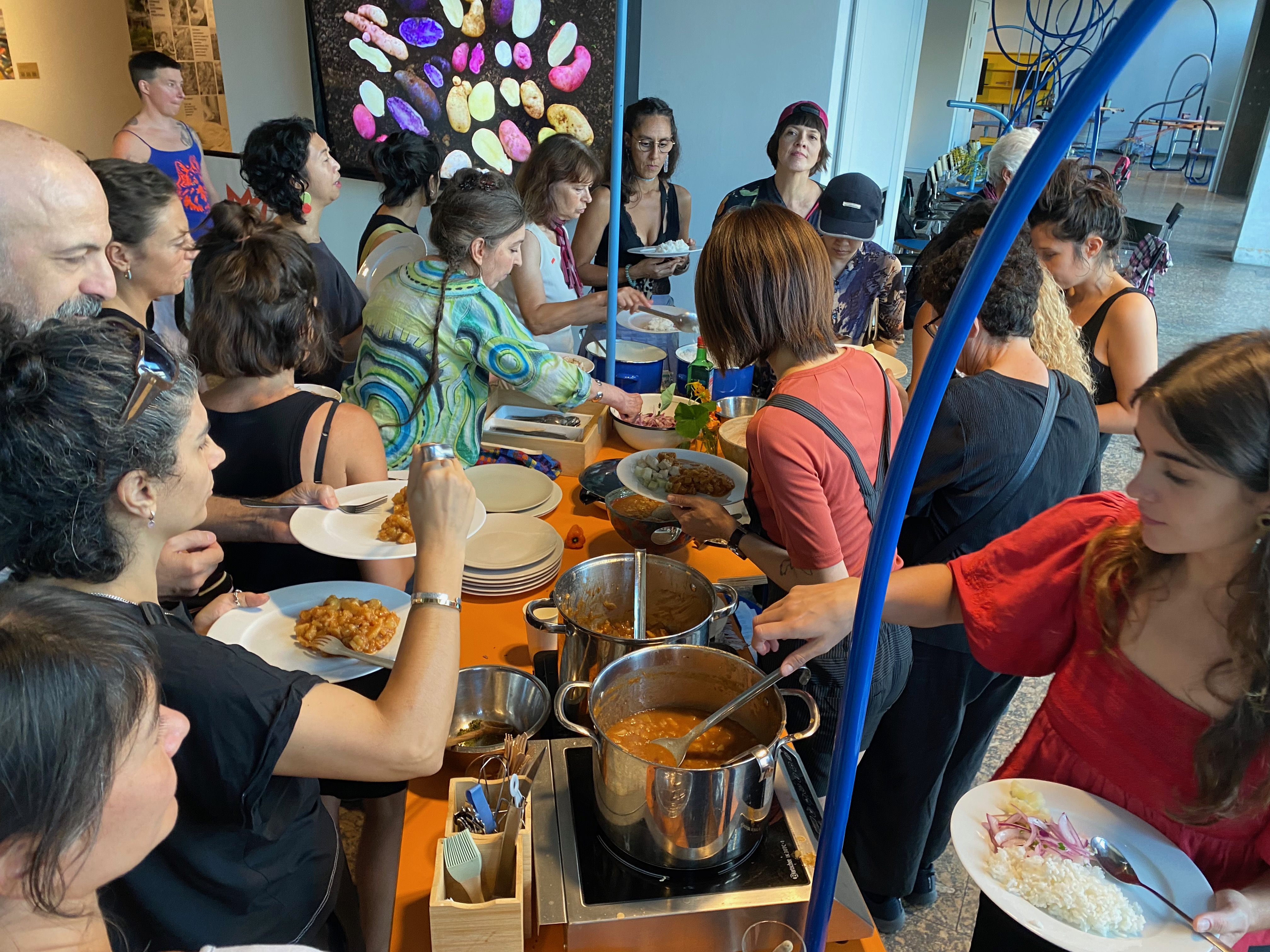
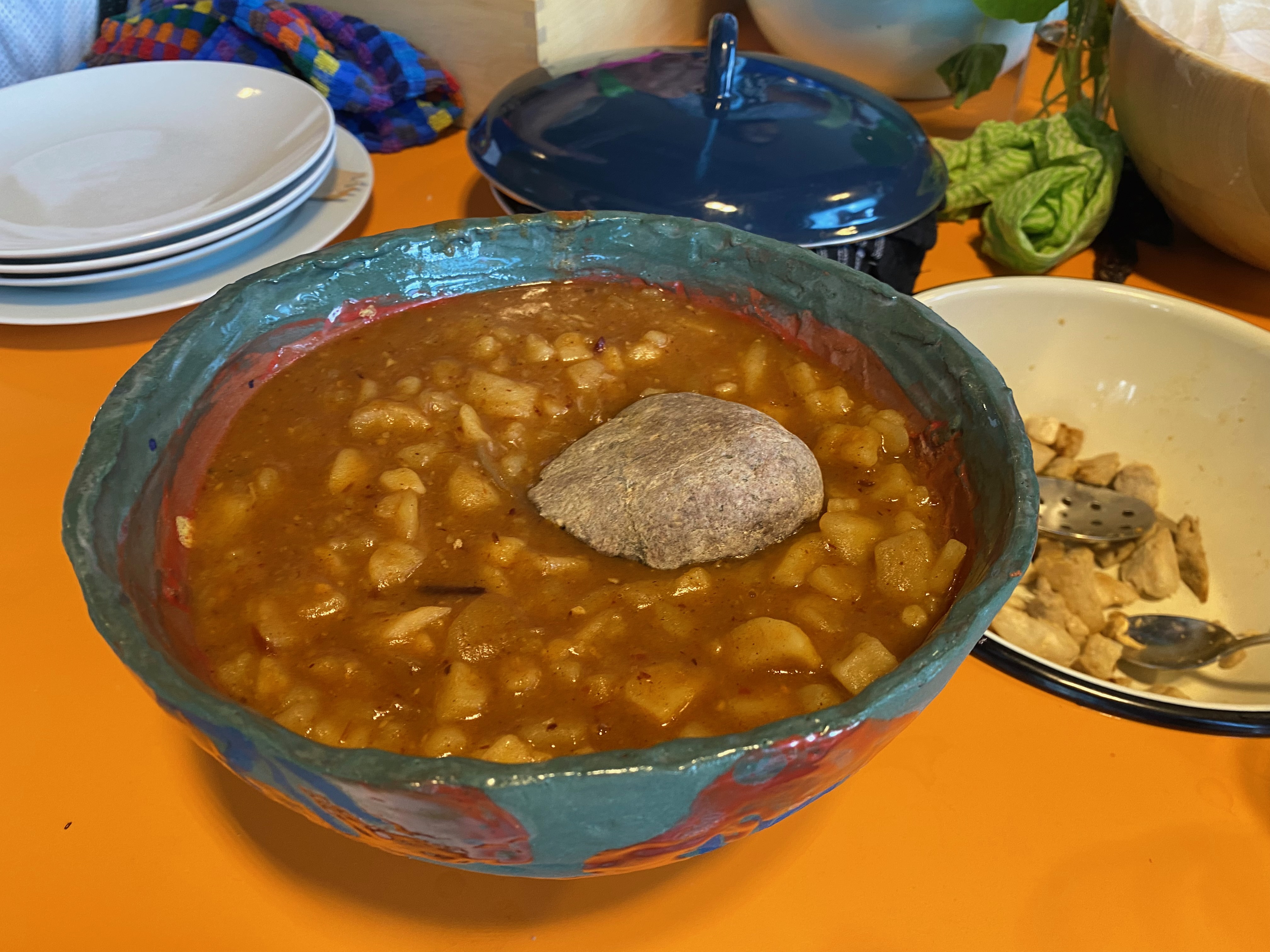

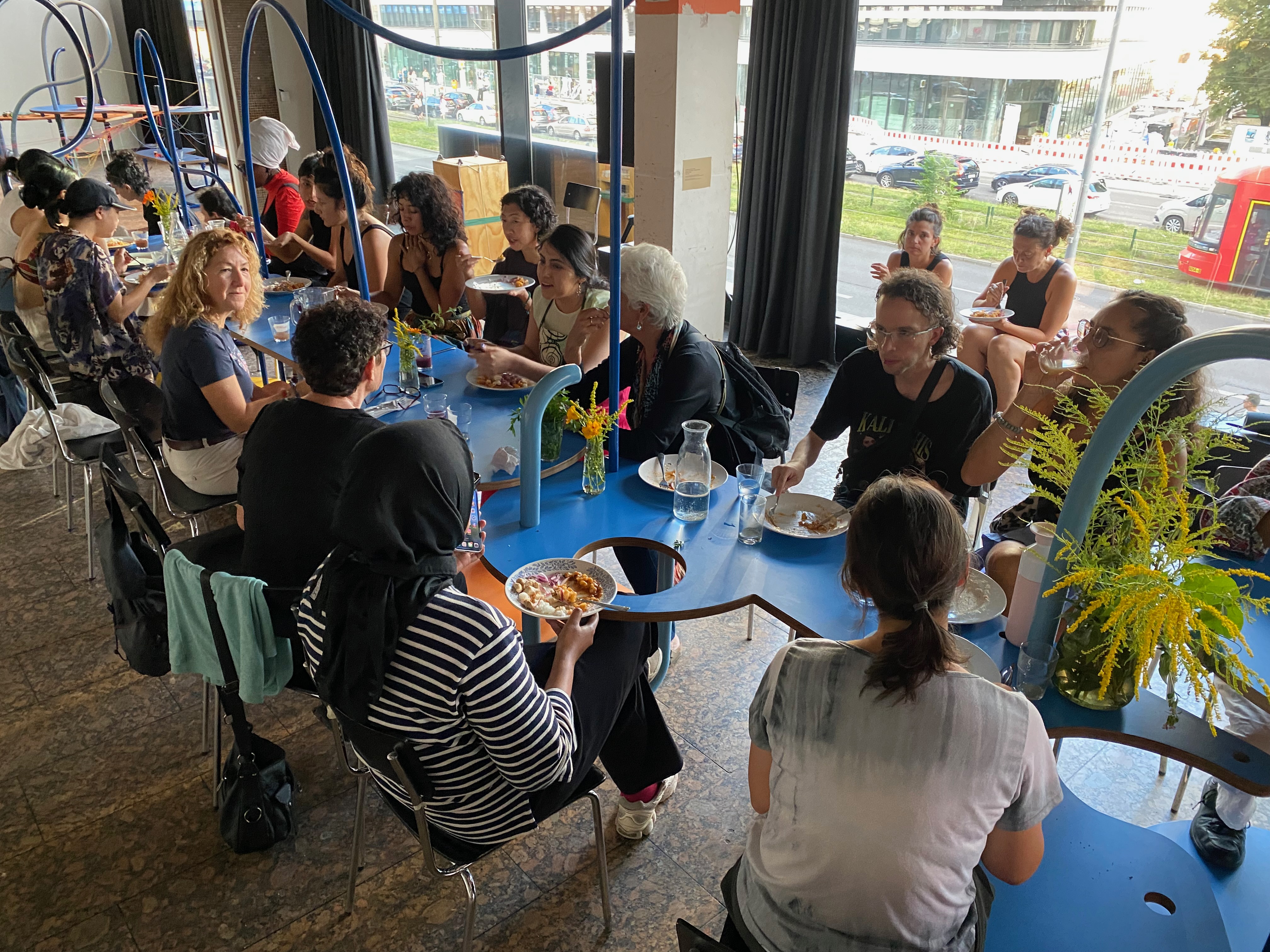
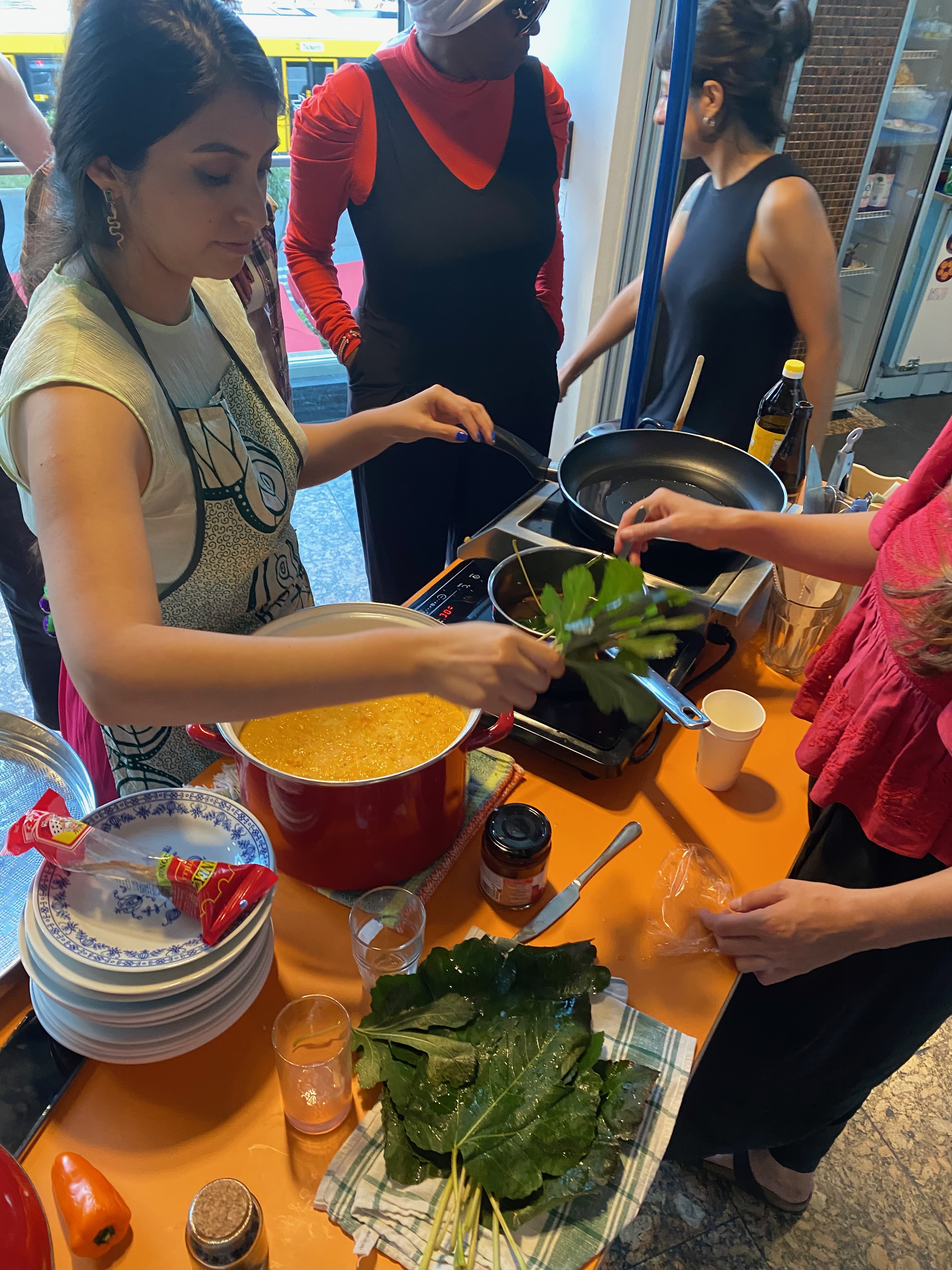
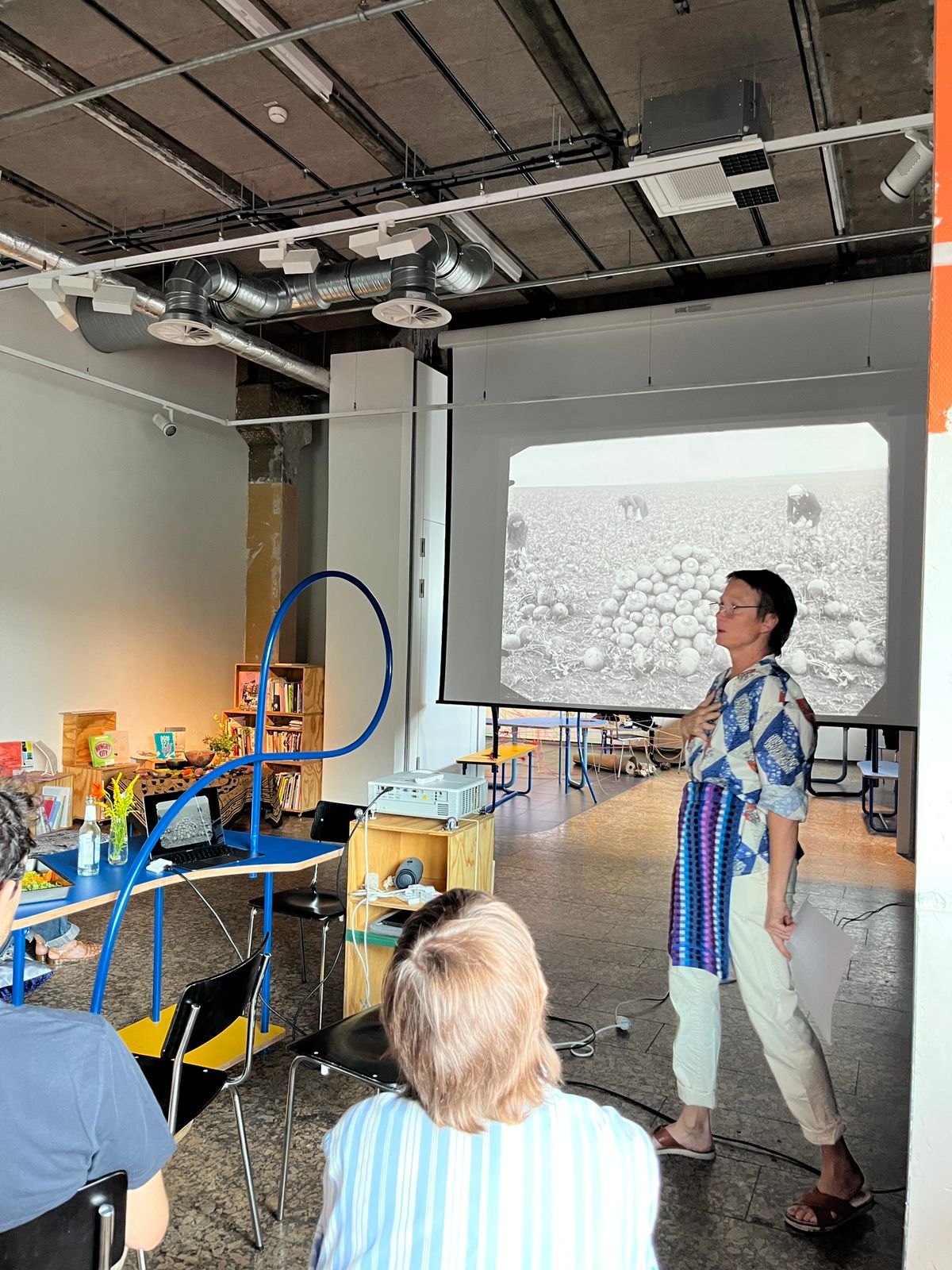
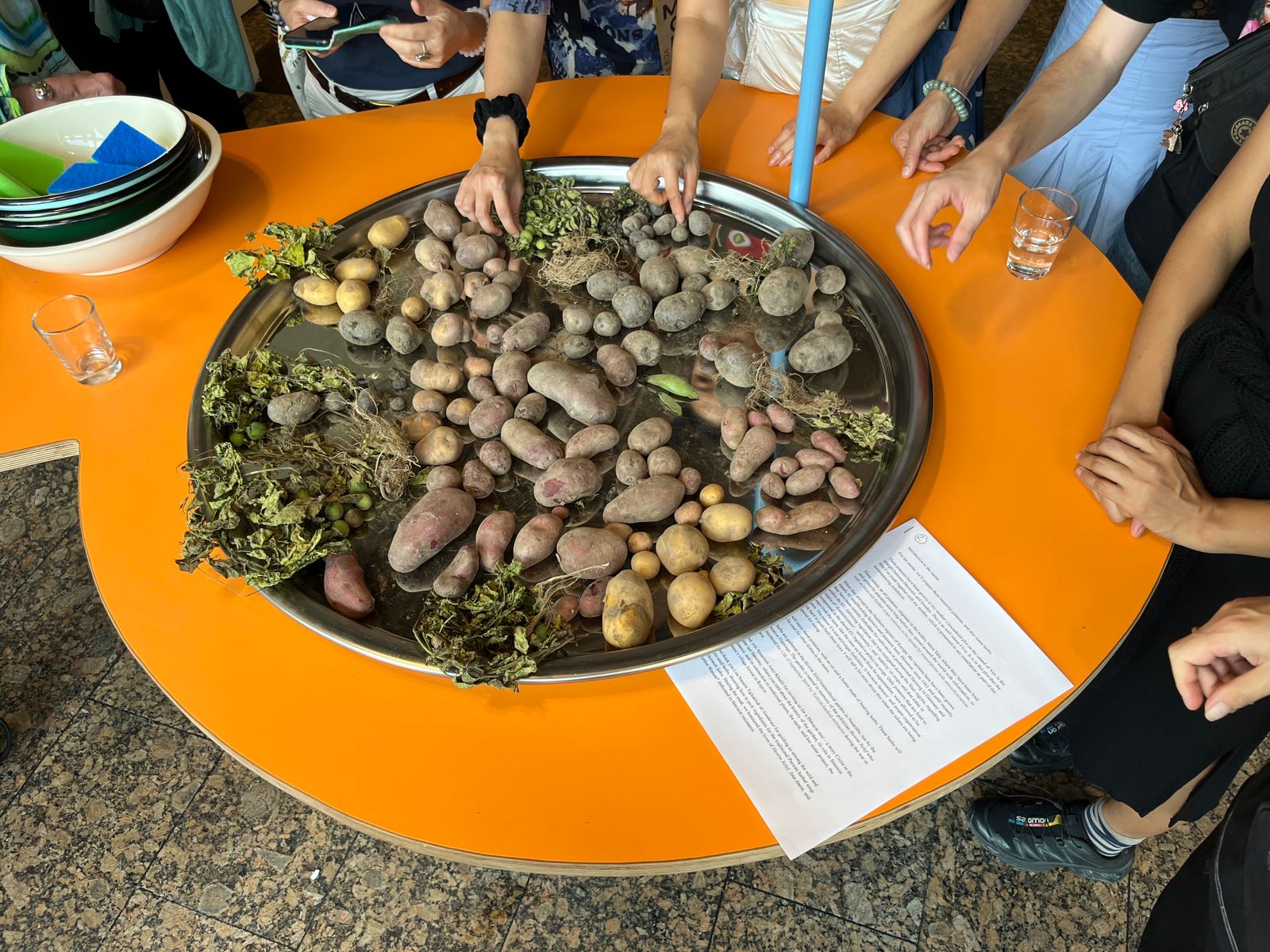
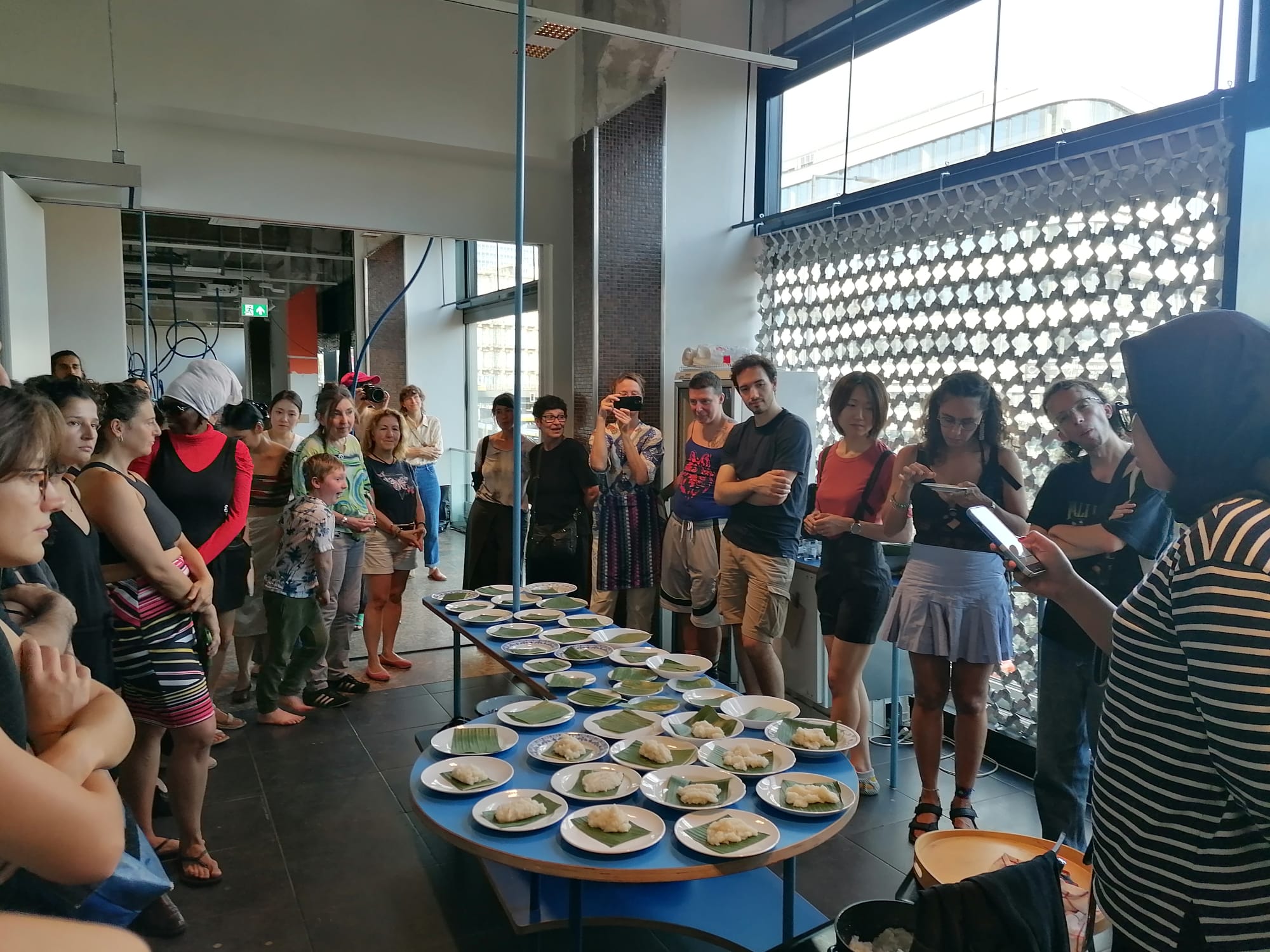
Workshop 2. In this session, with members of Women in Exile, curator Gatari Surya Kusuma and artists Daniela Zambrano Almidón, and Åsa Sonjasdotter, will reflect on themes of colonialism, migration, resistance and food through the lens of root crops such as potatoes, sweet potatoes, and cassava, as well as healing herbs.
This cooking session and extended dinner aims to re-learn practices that recognize Mother Earth as a grounding foundation. Participants will explore different contexts brought by Zambrano Almidón, Surya Kusuma and Sonjasdotter, using herbs from Flamingo collective’s Hevrîn Xelef garden and engaging in dialogue with members of Women in Exile.
Throughout the dinner, a series of interconnected stories will be shared through recipes. Recipes are not merely instructions for making a dish but also invitations to explore various social and earthbound relationships. This gathering will illustrate how food, plants, knowledge, and culture are deeply rooted in womxn and the land.
By participating in this cooking session and dinner, attendees will engage in processes of decolonization and healing. The exploration of the migratory journeys of potatoes, sweet potatoes, cassava and herbs will reveal ways to live in harmony with ecosystems and strengthen communities through food sovereignty and natural healing.
Women in Exile is an initiative of refugee women founded in Brandenburg in 2002 to fight for their rights. Women in Exile has made the experience that refugee women are doubly discriminated against, not only by racist laws in general but also as women. The organisation is a platform for refugee women. The organisation brings the inhumane living conditions of refugee women to the public and develop strategies for political change. The members see themselves as one of the few bridges between the refugee movement and the women’s movement. It was in this spirit of solidarity that Women in Exile and Friends was created in 2011 and activists without a refugee background joined.
Natasha, the Singapore Biennale, 2022 - 2023.
The action of Papitas Tarpuycha – Earthing Potatoes contributes to Natasha with a series of interventions in public space towards the celebration of a Pachamancha, a Quechua ancestral technique of cooking on the land and in the community. (Sunday March 12. 11.00am. Southern Islands, Singapore.) From a sculptural installation on the Southern Islands in Singapore, to actions open to public participation in a village in the region of Huánuco, Peru; a farm field in the region of Scania, Sweden; and a potato plantation in Java, Indonesia – the action finally returns to Singapore for the gathering of vegetables in the Pasir Panjang Wholesale Centre, and in a sweet potato garden in Seletar Aerospace Heights before celebrating the Pachamanca.
Gathering vegetables for the Pachamanca with wholesale agent in second generation Mr Kenny Chua. Mr Chua demonstrates how the vegetable market at the Pasir Panjang Wholesale Centre operates, as well as he shares the story of his family and the changes in vegetable trade they have experienced since the 1970s. (Friday, March 10, 8pm. Pasir Panjang Wholesale Centre, Singapore.)





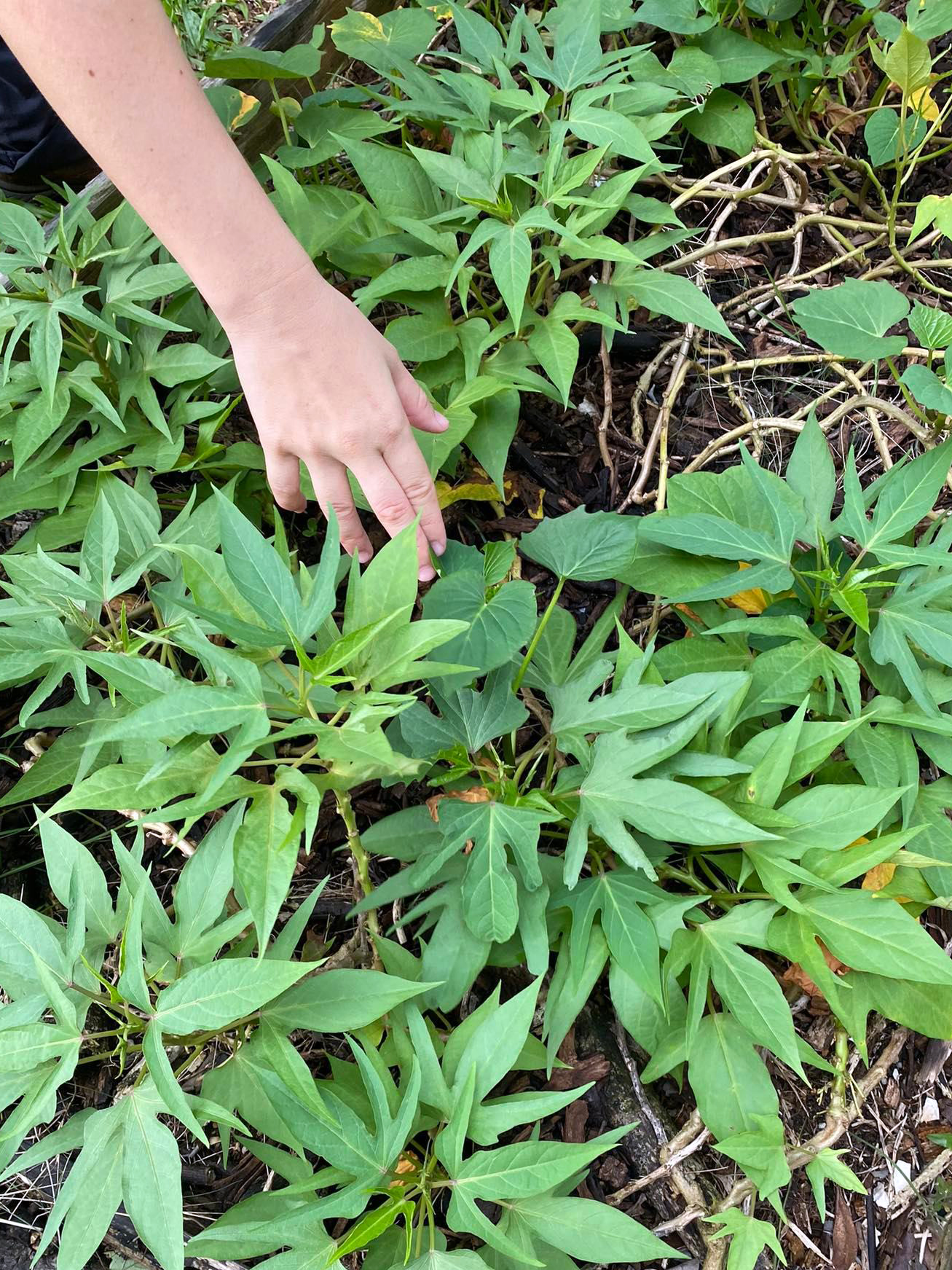


Gathering sweet potato leaves for the Pachamanca in the syntropic garden of farmer and designer Ee Peng. Diverting local waste streams into high utilization for agricultural and horticultural developments, Ee Peng attends to an edible garden providing herbs for the staff at the Wah Son Engineering industires. (Saturday March 11. 10.30am. Wah Son Engineering Pte Ltd, 1 Seletar Aerospace Heights.)

Joining us in the Wah Son Engineering industries, writer and curator Gatari Surya Kusuma, called Gatari, from Java, Indonesia, shares her work on how narratives and rituals become tools for preserving local knowledge. Based on her close experience of the relations between cassava, myth, and the story about the crisis, Gatari invites to a storytelling session inspired by the monoculture plantations that ruins rooted culture and local knowledge. (Saturday March 11. 10.30am. Wah Son Engineering Pte Ltd, 1 Seletar Aerospace Heights.)

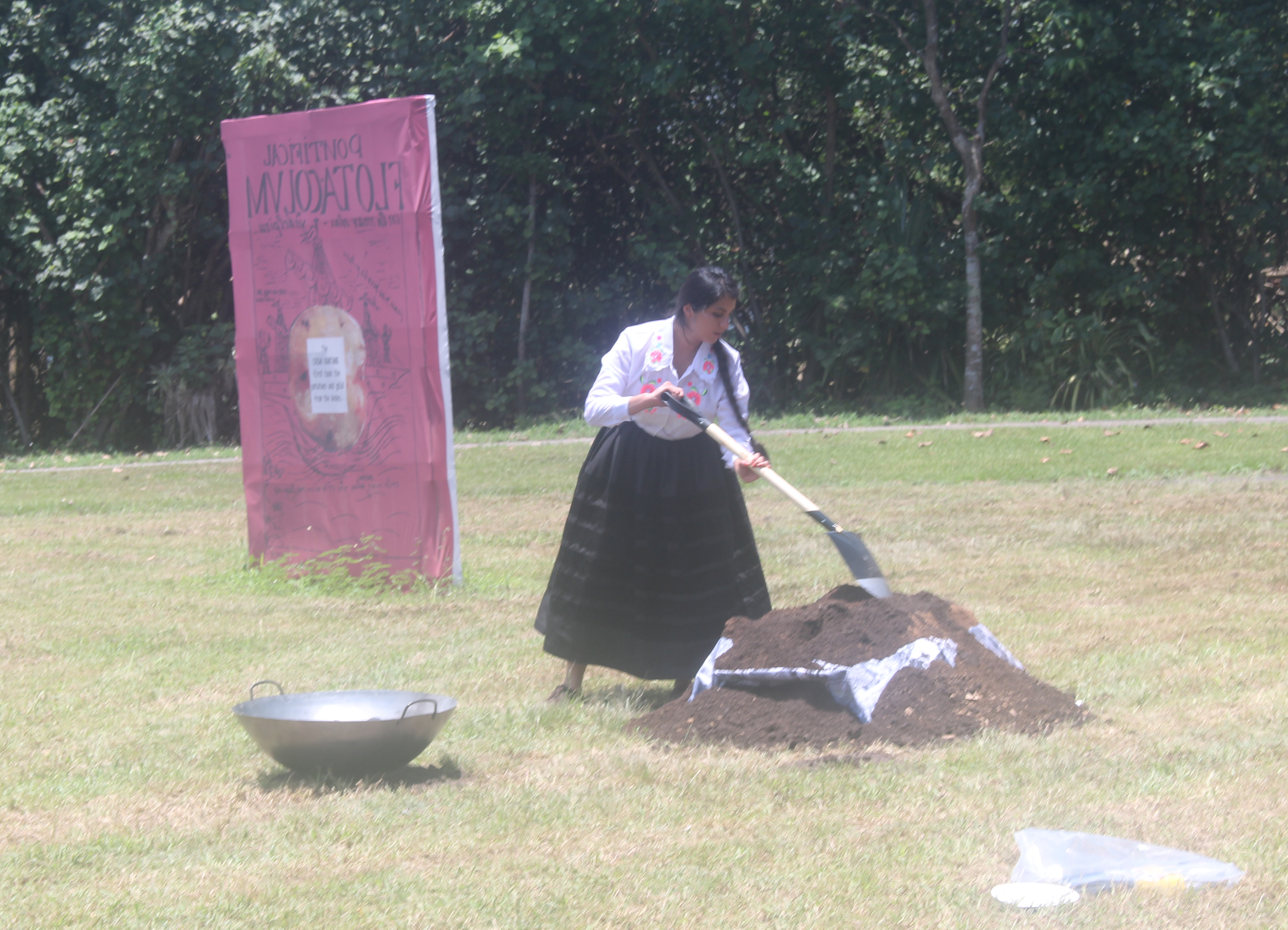
Artist and researcher Zambrano Almidón brings to debate and reflection the topic of migration and food production, as well as she shares a Pachamanca (earth pot), an ancestral technique of cooking on the land and in the community. (Sunday March 12. 11.00am. Southern Islands, Singapore.)